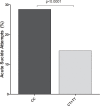The TRKB rs2289656 genetic polymorphism is associated with acute suicide attempts in depressed patients: A transversal case control study
- PMID: 30308049
- PMCID: PMC6181406
- DOI: 10.1371/journal.pone.0205648
The TRKB rs2289656 genetic polymorphism is associated with acute suicide attempts in depressed patients: A transversal case control study
Abstract
Introduction: Suicide Attempts (SA) are the main complications of Major Depressive Episodes (MDE) and are difficult to predict. Suicide is associated with the expression of Receptor Tyrosin-Kinase B (TRKB), the receptor of the Brain Derived Neurotrophic Factor (BDNF) involved in MDE. However, the impact of its genetic polymorphisms as predictive factors of SA should be clarified. Our main aim is to assess the association of 8 TRKB genetic polymorphisms and SA in depressed patients.
Material and methods: In 624 patients currently experiencing an MDE in the context of Major Depressive Disorder (MDD) (METADAP study), we assessed the association between 8 TRKB genetic polymorphisms (rs1778933, rs1187352, rs2289658, rs2289657, rs2289656, rs3824519, rs56142442 and rs1439050) and acute (previous month) or past (older than one month) SA. Bonferroni corrections and multivariate analysis adjusted for age, sex, level of education, marital status, Hamilton Depression Rating Scale score and previous MDE were used.
Results: The rs2289656 was associated with acute SA (CC = 28.5%, CT = 15.0% and TT = 11.5%, p = 0.0008). However, the other SNPs were not. Patients with the CC genotype had a higher rate of acute SA (28.5%) as compared to T carriers (14.6%) (adjusted OR = 2.2, CI95% [1.4; 3.5], p<0.0001).
Conclusion: The TRKB rs2289656 CC genotype is associated with a 2.2 fold higher risk of acute SA in depressed patients. If this result could be confirmed, this TRKB SNP may be assessed to contribute to the prediction of SA in depressed patients.
Conflict of interest statement
Eric Deflesselle, Romain Colle, Laurent Rigal, Céline Verstuyft, Albane Vievard, Severine Martin, Emmanuelle Corruble have no conflict of interest to disclose. Denis Joseph David currently receives investigator-initiated research support from Lundbeck and served as a consultant in the areas of target identification, validation and new compound development to Lundbeck Inc., Roche and Servier. Laurent Becquemont was an investigator for Antisense Therapeutics, Alnylam Pharmaceuticals, Alexion, Actelion, Auris Medical, Gilead Sciences, Ionis Pharmaceuticals, MedDay Pharma, Novartis, PregLem SA, Ultragenix Pharmaceutical. He received consulting fees from Sanofi-Aventis, Pfizer, Kyowa Kirin and Servier, lecture fees from Genzyme, GlaxoSmithKline, Bristol-Myers Squibb, Merck Sharp and Dohme; a close family member works at Sanofi France. This does not alter our adherence to PLOS ONE policies on sharing data and materials
Figures
Similar articles
-
No impact of eight NTRK2 genetic polymorphisms on 6-month antidepressant efficacy in depressed patients.Pharmacogenomics. 2017 Mar;18(4):349-357. doi: 10.2217/pgs-2016-0165. Epub 2017 Feb 17. Pharmacogenomics. 2017. PMID: 28244805
-
Association of genetic variants in the neurotrophic receptor-encoding gene NTRK2 and a lifetime history of suicide attempts in depressed patients.Arch Gen Psychiatry. 2010 Apr;67(4):348-59. doi: 10.1001/archgenpsychiatry.2009.201. Epub 2010 Feb 1. Arch Gen Psychiatry. 2010. PMID: 20124106 Free PMC article.
-
Sequence variations of ABCB1, SLC6A2, SLC6A3, SLC6A4, CREB1, CRHR1 and NTRK2: association with major depression and antidepressant response in Mexican-Americans.Mol Psychiatry. 2009 Dec;14(12):1105-18. doi: 10.1038/mp.2009.92. Epub 2009 Oct 20. Mol Psychiatry. 2009. PMID: 19844206 Free PMC article. Clinical Trial.
-
Genetic variations in the p11/tPA/BDNF pathway are associated with post stroke depression.J Affect Disord. 2018 Jan 15;226:313-325. doi: 10.1016/j.jad.2017.09.055. Epub 2017 Sep 29. J Affect Disord. 2018. PMID: 29028593
-
BDNF/TRKB/P75NTR polymorphisms and their consequences on antidepressant efficacy in depressed patients.Pharmacogenomics. 2015;16(9):997-1013. doi: 10.2217/pgs.15.56. Epub 2015 Jun 30. Pharmacogenomics. 2015. PMID: 26122862 Review.
Cited by
-
Candidate Biomarkers of Suicide Crisis Syndrome: What to Test Next? A Concept Paper.Int J Neuropsychopharmacol. 2020 Apr 21;23(3):192-205. doi: 10.1093/ijnp/pyz063. Int J Neuropsychopharmacol. 2020. PMID: 31781761 Free PMC article. Review.
-
Putting Cells in Motion: Advantages of Endogenous Boosting of BDNF Production.Cells. 2021 Jan 18;10(1):183. doi: 10.3390/cells10010183. Cells. 2021. PMID: 33477654 Free PMC article. Review.
-
The Neurotrophin System in the Postnatal Brain-An Introduction.Biology (Basel). 2024 Jul 24;13(8):558. doi: 10.3390/biology13080558. Biology (Basel). 2024. PMID: 39194496 Free PMC article. Review.
-
BDNF Val66Met Polymorphism Is Associated With Motor Recovery After Rehabilitation in Progressive Multiple Sclerosis Patients.Front Neurol. 2022 Feb 21;13:790360. doi: 10.3389/fneur.2022.790360. eCollection 2022. Front Neurol. 2022. PMID: 35265024 Free PMC article.
-
Race-Dependent Association of Single-Nucleotide Polymorphisms in TrkB Receptor in People Living with HIV and Depression.Neurotox Res. 2021 Dec;39(6):1721-1731. doi: 10.1007/s12640-021-00406-1. Epub 2021 Oct 6. Neurotox Res. 2021. PMID: 34613587 Free PMC article.
References
-
- Kessler RC, Borges G, Walters EE (1999) Prevalence of and risk factors for lifetime suicide attempts in the National Comorbidity Survey. Arch Gen Psychiatry 56: 617–626. - PubMed
Publication types
MeSH terms
Substances
LinkOut - more resources
Full Text Sources
Miscellaneous


